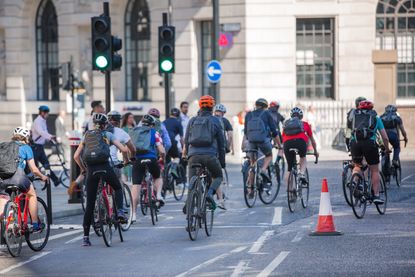Illegal e-bike use won’t be stopped by banning cycling in cities, it’ll just inconvenience those who want to make our urban areas a better place
Birmingham City Council is considering closing off parts of its pedestrianised centre to bikes, but the real issue is electric motorbikes



News editor at Cycling Weekly, Adam brings his weekly opinion on the goings on at the upper echelons of our sport. This piece is part of The Leadout, a newsletter series from Cycling Weekly and Cyclingnews. To get this in your inbox, subscribe here. As ever, email adam.becket@futurenet.com - should you wish to add anything, or suggest a topic.
Imagine, if you will, that you are a commuter who has established that cycling through the middle of a British city is the easiest way for you to get to work. It’s probably one of the cheapest methods, the greenest, the easiest, the best for you. Most of it might not be on specific bike infrastructure, because that hasn’t been built, so you have to share the road with cars.
However, thankfully, there is a bit on the journey where you are allowed to cycle in a pedestrianised area, away from cars. Maybe it saves you five minutes, maybe it just means you don’t have to stay on a busy road. You’re probably conscientious, maybe you’re even a good bell user. Sharing the space with pedestrians just works, especially if you slow down.
This person could be me - the easiest way from my house to the middle of Bristol (UK) involves some shared spaces with pedestrians - and I make a point of reducing my speed in these instances, knowing that I’m the least vulnerable presence in that situation. Whether I’m on my pub bike or my road bike, it’s clear that at points where pedestrians and cyclists come into contact, it’s my responsibility to take more care.
Not all cyclists take the same approach, and the problem of fast-moving bicycles within urban areas is exacerbated by the use of illegally modified e-bikes which provide assistance over the permitted 15mph.
These pedal-powered machines look like bikes, until closer inspection reveals batteries gaffer-taped to the frame. Travelling at 20mph, sometimes without any input from the rider, these are illegal electric motorbikes, not bicycles.
Many - but not all - of the riders aboard these bikes are fulfilling deliveries. If you have wondered how you can get a takeaway delivered to your home so quickly and cheaply, consider these illegal e-bikes a factor, alongside companies of late capitalism taking advantage of their precarious labour.
To the untrained eye, these riders may look like any other cyclist, resulting in the tarring of an entire mode of transport with the same brush. As a result, councils are cracking down on cycling in pedestrian areas, as if through penalising all people on two wheels they can stop the issues with illegal e-bike use.
Get The Leadout Newsletter
The latest race content, interviews, features, reviews and expert buying guides, direct to your inbox!
Last week it was revealed that Birmingham City Council is considering banning cycling through the UK city centre, because they want to reduce the "likelihood of near misses and collisions" with pedestrians. These near misses are not the responsibility of all cyclists; a blanket ban on cycling helps nobody, and pushes riders back onto the road. This will not lead to higher levels of two-wheeled activity, which, by its nature, reduces the strain on the roads posed by cars, vans and lorries.
“We are considering measures to try and decrease instances of cycling at speed through one small area of the city centre where there is high footfall, and it is unsafe to cycle due to the likelihood of near misses and collisions," a spokesperson told the BBC.
It should not be a surprise that we at Cycling Weekly are keen on getting as many people riding as possible. We think - shock - that cycling is the best mode of transport, whether you’re a racer or someone trying to get to work, someone needing to take your child 10 minutes to the school gates, or heading out on a century loop on a fitness journey. However, sometimes we run smack bang into the reality of cycling in the UK, which isn’t always a helpful place.
More legislative, and police, action is needed e to target illegal electric bikes - if they’re bikes modified to use batteries, these are the ones that often cause fires, incidentally - but restrictions on where people choosing to travel by bike can cycle is a backwards step, one that feels all too common in this country. If we are going to get more people out of cars, onto bikes, then we need to give them more safe places to cycle, not less.
This piece is part of The Leadout, the offering of newsletters from Cycling Weekly and Cyclingnews. To get this in your inbox, subscribe here.
If you want to get in touch with Adam, email adam.becket@futurenet.com.

Thank you for reading 20 articles this month* Join now for unlimited access
Enjoy your first month for just £1 / $1 / €1
*Read 5 free articles per month without a subscription

Join now for unlimited access
Try first month for just £1 / $1 / €1

Adam is Cycling Weekly’s news editor – his greatest love is road racing but as long as he is cycling, he's happy. Before joining CW in 2021 he spent two years writing for Procycling. He's usually out and about on the roads of Bristol and its surrounds.
Before cycling took over his professional life, he covered ecclesiastical matters at the world’s largest Anglican newspaper and politics at Business Insider. Don't ask how that is related to riding bikes.
-
 'With a few changes, it'll be class' - Josh Tarling optimistic about Ineos Grenadiers future
'With a few changes, it'll be class' - Josh Tarling optimistic about Ineos Grenadiers future'Everybody wants to get better and get back to winning,' 20-year-old tells audience at Rouleur Live
By Tom Davidson Published
-
 'Knowing the course in a virtual race is maybe even more important than in road racing': Former e-sports World Champion's top tips
'Knowing the course in a virtual race is maybe even more important than in road racing': Former e-sports World Champion's top tipsSpeed skater turned eSports world champion, Loes Adegeest, on how to become virtually unbeatable when racing indoors
By Chris Marshall-Bell Published